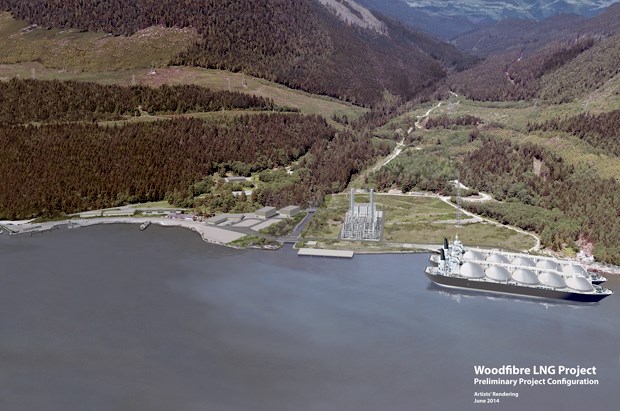Squamish Nation council has given its environmental approval for Woodfibre LNG’s proposed natural gas processing and export project on Howe Sound.
Council voted 12-2 on Wednesday to grant Woodfibre an environmental certificate – a legally binding agreement that will ensure the gas company abides to a series of conditions the nation said were necessary in order to go ahead.
Among those conditions: Providing better environmental assurances that the plant’s cooling system won’t damage herring stocks with its intake pipe or chlorinated outflow, moving the project’s compression plant father away from Squamish Nation members’ homes near the municipality of Squamish, and ensuring that nation members will be able to hunt and fish on their traditional territory where the plant is proposed to be built.
“For our Nation the environment comes first,” said Chief Ian Campbell in a press release following the vote. “But there is more, much more, to be done. During our community meetings, members made clear their priorities — environmental protection and public safety among others and we intend to set these into law.”
The nation chose to run its own assessment because the provincial one didn’t address issues around Aboriginal rights and title, Campbell said.
“The assessment represents an exercise in Squamish Nation self-determination by moving beyond mere consultation and getting to First Nation consent. Our decision today reflects the interests, the will, and the beliefs of our members. It is our future — our decision to make,” Campbell said.
The provincial environmental assessment for the project is still ongoing, as is Squamish Nation’s assessment for the Fortis B.C. gas pipeline, which will lead to the plant.
Although a clear majority of band council voted in favour, there is much more opposition among Squamish Nation members, according to activist Clarissa Antone.
“The band members are totally against the LNG,” Antone said. “If you look on Facebook, there’s a lot of angry, angry members.”
Antone said she believes the environmental risks are too great, pointing to other places in North America where First Nations have been impacted by energy development
“They even have to go and buy their water. I don’t want that to happen to our children,” she said. “I will never allow this to happen. I will keep fighting this. I don’t want it to happen. It’s not good for us at all.”
Antone said she would continue to attend band council meetings and encourages fellow nation members opposed to the project to do the same.
Byng Giraud, vice-president corporate affairs, Woodfibre LNG, said he was pleased with the update and the process.
“This has been a long time in the making. We started engaging the Squamish Nation in mid-2013,” he said.
“It’s a new and innovative process so I think we were taking a bit of a risk but Squamish Nation treated us fairly. It was a rigorous process. We knew we were going to have to meet some higher standards and additional conditions by entering the process,” he said. “These are significant conditions. There are costs and additional work that’s going to need to be done but if that’s what it takes to earn their support, if that’s what it takes to meet that higher standard, we’re absolutely willing to do it.”



